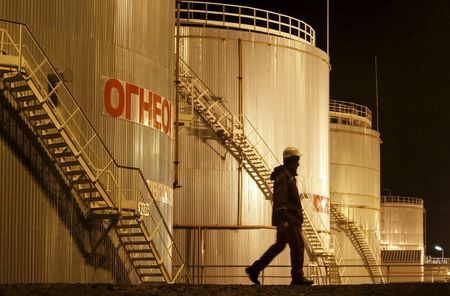

Investing.com – Financial markets in Saudi Arabia face a difficult outlook as the country faces the possibility of an “oil winter.”
Analysts at BCA Research say the kingdom's economy, which remains tightly tied to revenues, is vulnerable to expected declines in global oil prices and slower nominal growth.
While efforts under Vision 2030 have boosted domestic demand through diversification, the broader economic picture remains fraught with risks.
Over the past year, Saudi Arabia has made great strides in reducing its dependence on oil exports, as evidenced by a 4.4% growth in real domestic demand despite declining oil revenues.
Infrastructure investments and borrowing, both domestically and internationally, have played a major role in sustaining consumption and business activity.
However, overall GDP growth has lagged, slipping into negative territory in 2023-24, with oil export revenues, a crucial component, faltering.
The correlation between oil prices, nominal GDP, and the stock market is particularly stark. Saudi stocks, which closely align with the health of the broader economy and domestic consumption, are likely to suffer if crude oil prices decline further.
BCA Research expects global crude oil demand to remain weak in 2025 due to slowing global growth, keeping oil prices under pressure.
Furthermore, Saudi Arabia's cautious stance on production – which aims to avoid oversupplying the market – means that the Kingdom's oil revenues are likely to continue to face headwinds.
Fiscal policy adds another layer of uncertainty. The proposed 2025 budget includes significant spending cuts of 4.5% from 2024 levels, a step aimed at reducing the rise in public debt.
However, this fiscal restriction threatens to stifle domestic liquidity and economic activity. High borrowing costs in Saudi Arabia, linked to the US Federal Reserve's interest rate policies due to the currency peg, exacerbate economic pressures, limiting credit growth and private sector investment.
At the same time, public debt has ballooned, rising from $12 billion in 2014 to $306 billion in 2024, now representing 28% of GDP.
This trajectory is unlikely to be reversed soon, given the dual pressures of weak oil revenues and ongoing expenditures associated with Vision 2030.
For investors, the outlook is cautious. BCA Research recommends maintaining a neutral stance towards Saudi stocks within emerging market portfolios, reflecting doubts about the market's ability to outperform amid these challenges.
Likewise, Saudi Arabia's sovereign credit rating was downgraded from overweight to neutral due to higher debt levels and widening credit spreads compared to emerging market peers.







